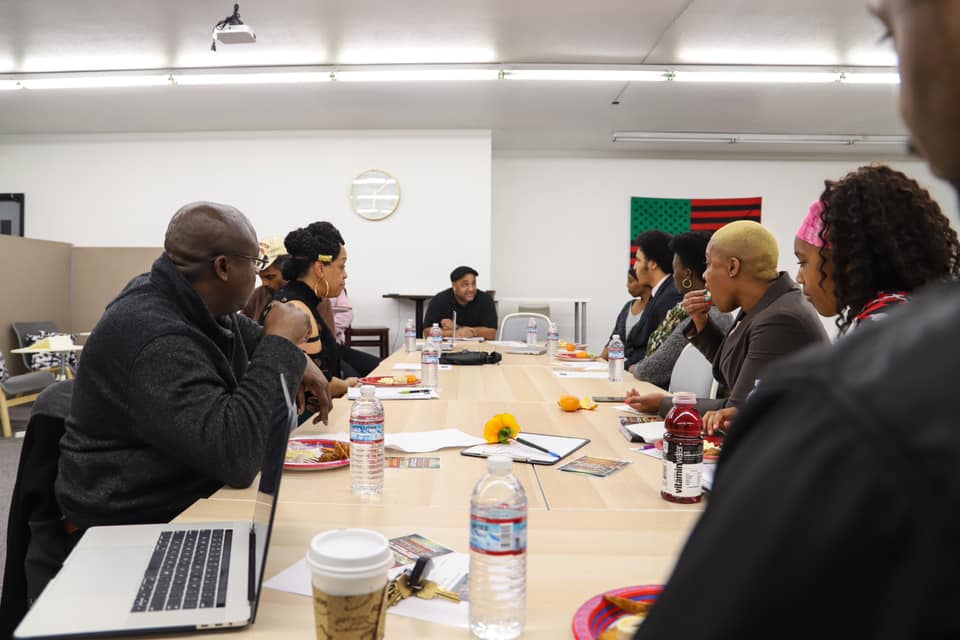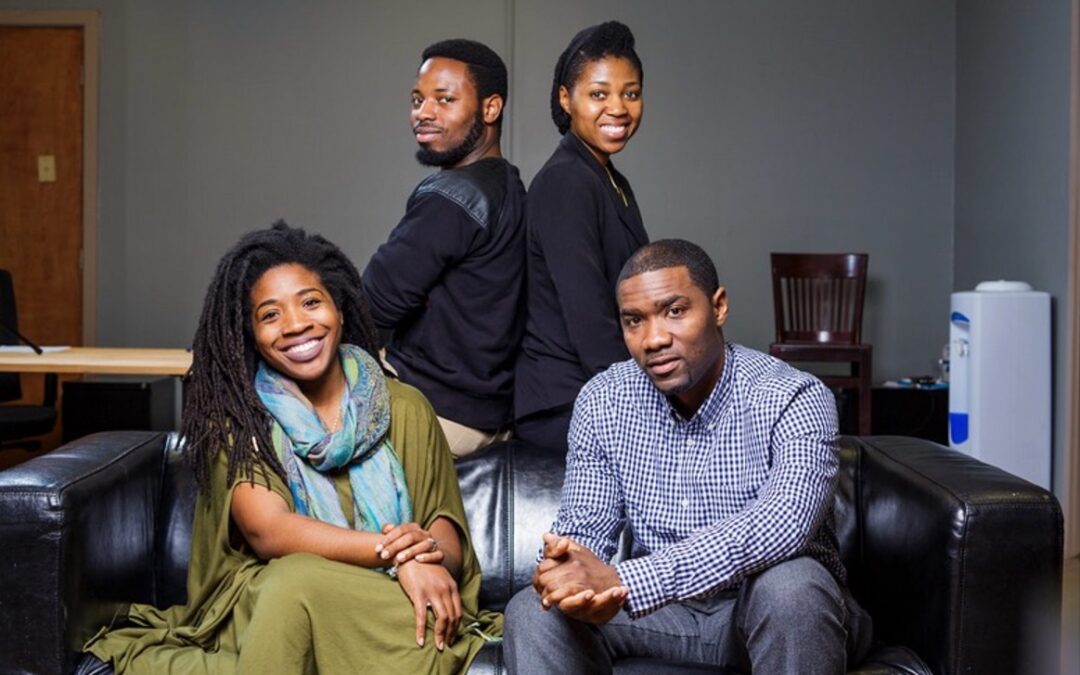I am always excited to discover new entrepreneur communities in Seattle. So I was thrilled to learn about Black Dot. Black Dot is a startup community hub that serves current and aspiring black entrepreneurs in Seattle’s Central District, also known as Africatown.
Black Dot creates and nurtures black entrepreneurs by providing space and access to resources uniquely geared to African Americans. And they address the unique problems that black entrepreneurs face when starting a business.
K. Wyking Garrett, Aramis Hamer, Monica Washington, and Mujale Chisebuka started Black Dot in 2015 after their participation in a startup event, Hack the Central District. (clockwise from upper left: Mjuale Chisebuka, Monica Washington, K. Wyking Garrett and Aramis Hamer. Photo: Geekwire Photo credit: Ken Lapworth.)
Black Dot offers membership to an amazing community of likeminded entrepreneurs. This membership includes affordable shared and private workspaces for rent, events and workshops, support and mentorship, and a place to hang out.
Curtiss Calhoun is the Community Manager at Black Dot and Lead Program Director. He shared his thoughts on what makes Black Dot special and where this organization is headed. Quotations are his unless otherwise noted.
Black Dot Serves a (Very) Wide Variety of Entrepreneurs
There is no “typical” black entrepreneur. Community members range from accountants to real estate brokers, restaurant owners, and high tech CEOs.
“It’s an amazing community. I along with Jenefeness Tucker have facilitated weekly Mastermind sessions since Oct 2018. Some just have an idea or concept they are thinking about. And then we’ve had people like a telecom guy who was just awarded $10 million to start his own phone network in Africa.”
Mastermind Mondays is a program where black entrepreneurs can connect, get inspired and solve problems. Anyone can attend. People join in from around the US. Even other countries, including a group of exchange students from Spain who stayed connected with the group when they returned home.
Mastermind offers a sense of family that people look forward to every week and can count on as a source of support.

Curtiss Calhoun leading a Mastermind Mondays session. Photo: Black Dot
When I asked Curtiss to talk about the unique hurdles black entrepreneurs face when starting a business, his answer was powerful:
“The #1 hurdle is being Black. Walking into a bank, being black, asking for money is just a different experience. Not so much the process. But the way the system is set up to make it more difficult to gain access to resources to start, build, and scale.”
He focused on three areas: lack of access to capital, business acumen (systems and structures), and affordable commercial space.
Capital
“A lot of people are good at something and they start a business. And it grows by word of mouth. But they don’t have enough capital and available liquid resources to weather the storms new businesses face.”
According to FIX, a systems design company founded in 2008 to solve complex urban challenges with place-based solutions:
- 28 MM US small businesses generate 64% of all new private sector jobs
- African Americans own just 7% of small businesses but represent nearly twice that as a percent of the total population
- Most small businesses start and expand using personal savings. But African Americans have 12x less median family wealth than whites and are 50% less likely to own their homes. So they don’t have these sources of capital to get started
- African American are 22% more likely to use personal credit cards to start a business
Business Acumen
Many aspiring black entrepreneurs don’t come from traditional business backgrounds. In addition to hosting Mastermind Mondays, Black Dot provides a number of different educational opportunities to address this, including hosting guest speakers and cross-industry professional networking events.
Black Dot is planning to add a formal startup curriculum, so black entrepreneurs can become certified and have the skills to be successful at whatever business they decide to start.

William Grose Center. Photo Black Dot
Affordable Commercial Space
Many black entrepreneurs have businesses that require physical space. But if you are a retailer or restaurant owner, the initial costs can be prohibitive.
One of the spaces Black Dot will have a presence in will be the William Grose Center for Cultural Innovation, a decommissioned firehouse which the Africatown Community Land Trust has taken ownership of and is currently renovating. It will primarily serve as an innovation hub and resource center for micropreneurs, solopreneurs and small business owners. They are planning to open in August 2021 and continue to build out additional space / capability.
How to Get Involved
I wanted to draw your attention to Black Dot because I suspect there are many similar black entrepreneur communities operating all over the country. And if each of us in the business world can find a way to support them, in whatever way we can, it will raise us all up.
So, my question to you is … what can you do?
Donate your money (always useful) to help underwrite similar programs in your community
Share your skills, whether it’s to lead a seminar or speak on an emerging technology
Open your networks, and introduce black entrepreneurs and community leaders to other organizations they might do business with
Pass the word on, and invite others to get involved
Volunteer
Let me know what happens!

